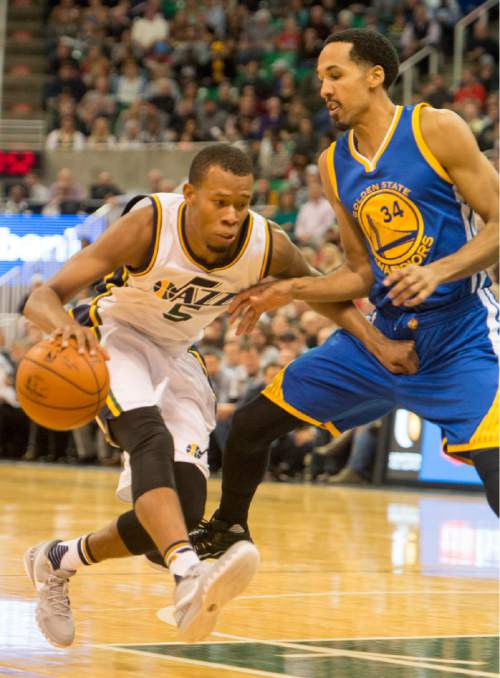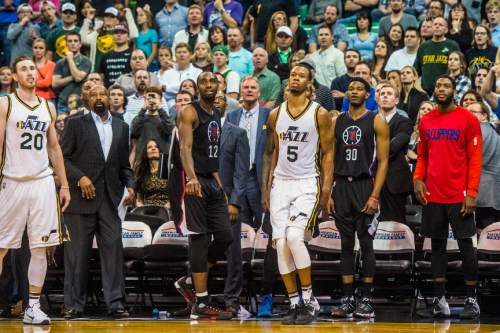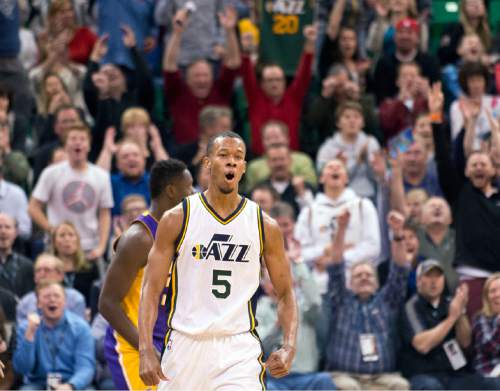This is an archived article that was published on sltrib.com in 2016, and information in the article may be outdated. It is provided only for personal research purposes and may not be reprinted.
Rodney Hood's vacation is almost over.
That's how little time the Utah Jazz's starting shooting guard is taking to rest his game, or on his laurels. He plans on returning to the court in the first week of May, and implementing a regimen that will take him back and forth between Salt Lake City and Atlanta.
His focus lies on strengthening his body and tightening his ball-handling. He wants to become a better defender. Most of all, Hood is hungry, disappointed that the Jazz aren't currently locked in a playoff battle with someone, anyone.
The failure to close will drive him and his teammates this summer. Hood will never deny that.
"It's definitely motivation for me," Hood said. "It's hard watching the playoffs, knowing we were in control of our destiny and didn't get it done. I think we had a great season, regardless of the end result. But it hurts to not be in the playoffs right now."
Hood answered a lot of questions in his second season out of Duke. He proved he could be a starter, and a scorer, as he averaged almost 15 points per game. After a rookie season plagued by injury, Hood proved his durability by playing in 79 games. On some nights, Hood looked like a future star. There's little doubt that the Jazz pulled off a steal by taking him with the 23rd pick in the 2014 NBA draft.
Still, Hood has improvements to make. He was inconsistent at times with his shot. There were times when he should've been more aggressive offensively. He didn't get to the free-throw line enough for a shooting guard, averaging just 2.2 attempts a night. On some nights, he wasn't good enough defensively.
Even so, Hood made a leap. He went from promising rookie to definitive starter. And in a year when the Jazz front office didn't receive as many long-term answers as it would've liked, due to injuries, Hood's progression has provided a promising foundation going forward.
"The biggest thing he wants to do is help the team get into the playoffs," Hood's agent, Travis King, told The Tribune. "He wants to help them get there and make a run, and he's upset to not get it done. He wants to be in better shape, and he wants to be able to be more physical on both ends. That's important to him personally."
The defining narrative of the NBA postseason is that the teams doing well are the teams with the closers, the teams with the guys who can get you buckets at the end of games.
The Cleveland Cavaliers defeated the Detroit Pistons 4-0 in what has to be one of the closest and most competitive sweeps in NBA history. All four games were hotly contested into the fourth quarter, but all went Cleveland's way because the Cavs had LeBron James and Kyrie Irving. They knew where they were going with the ball in the last five minutes, while the Pistons didn't.
Across the first-round landscape, that scenario has played out. The San Antonio Spurs have Kawhi Leonard. Golden State has myriad closers. The underdog Indiana Pacers are giving the Toronto Raptors all they can handle because they have a closer in Paul George, and Toronto has struggled there.
So, going forward, who can be the Jazz's closer?
It's one of the dominant issues of the offseason, one that won't readily be answered until next year at the earliest. Gordon Hayward has been the one with the ball in his hands, and he's delivered some, most notably a game-winning jumper at the buzzer to steal a game against Dallas in February.
Hayward needs help in that department, though. And that's where Hood can come in.
"Rodney's a team player," King said. "Whatever Quin [Snyder] decides, that's what Rodney will do. But I think he's proven he can hit big shots. He's shown he can put up 30 points in a half. He's shown that he's one of the top young shooting guards in the league."
In order for the Jazz to take the next step, they need to be better in fourth quarters, something the organization has acknowledged. Hood and Hayward are logical candidates in this regard. Hayward is adept at creating space for himself in iso situations, and has become good at drawing fouls. Hood is a creative pick-and-roll ball-handler. He's also a good passer for a shooting guard and creates shooting angles for himself.
And that's something Hood will work on, with himself and his teammates. He was thrown into the fire this season, relied on to take important shots. He made some. He missed a lot.
Going forward, he wants to make more than he misses.
"I think a lot of misses will stay with me," Hood said. "The one against Golden State [in November] was big for my progression. My teammates and coaches had full confidence in me to take those. I wound up making some later in the season."
Twitter: @tjonessltrib —
Rodney Hood's clutch résumé
• Missed a potential game-winning 3-pointer against Golden State in November.
• Made a game-tying 3 against the Dallas Mavericks in February, forcing overtime.
• Had the game-winning assist against the Houston Rockets, setting up Derrick Favors for the dunk.
• Made the rookie-sophomore game on All-Star weekend.
• Averaged 14.5 points per game.







